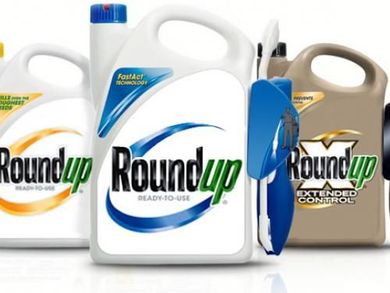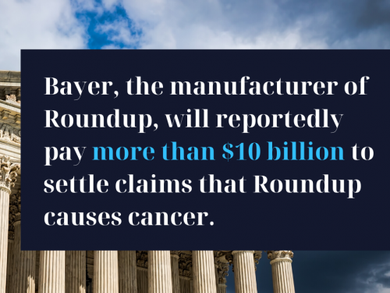
RoundUp’s manufacturer, Bayer, has reserved $9.6 billion to resolve Cancer lawsuits
If you or a loved one has been diagnosed with cancer after using Roundup weed killer, you may be entitled to compensation. Roundup, a popular herbicide manufactured by Monsanto, has been linked to non-Hodgkin's lymphoma and other forms of cancer. Thousands of people have filed lawsuits against Monsanto, alleging that the company knew about the dangers of Roundup but failed to warn consumers.
If you're considering filing a Roundup lawsuit, it's important to understand your legal options. You may be able to join a class action lawsuit, which allows multiple plaintiffs to file a single lawsuit against a defendant. Alternatively, you may file an individual lawsuit, which can provide more personalized attention and potentially higher compensation.
If you or a loved one has been diagnosed with cancer after using Roundup, don't wait to take action. Contact 1-800-LAW-FIRM today to learn more about your legal options and get the compensation you deserve.
Schedule a no-obligation, free claim review with a member of our team by filling out the following form.
Schedule a Free Claim Review

THE PRODUCT...
Roundup is the brand name of a systemic, broad-spectrum glyphosate-based herbicide produced initially by Monsanto, which Bayer acquired in 2018.
Glyphosate is the most widely used herbicide in the United States. Monsanto developed and patented the glyphosate molecule in the 1970s, and has marketed it as Roundup since 1973.
It retained exclusive rights to glyphosate in the US until its US patent expired in September 2000; in other countries, the patent expired earlier. The
Roundup
trademark is registered with the US Patent Office and is still extant. However, glyphosate is no longer under patent, so similar products use it as an active ingredient.

THE PROBLEM...
In 2015, the World Health Organization declared glyphosate was a probable carcinogen. Roundup’s manufacturer, Monsanto, continued to hide information about the cancer link until 2017. Some evidence shows Monsanto manipulated research, press releases, and safety documents and pressured the Environmental Protection Agency (EPA) to avoid discussing negative information about Roundup.
Significant exposure to Roundup or another Glyphosate-based Weed Killer may be linked to cancers such as:
Non-Hodgkins Lymphoma, Small Lymphocytic Leukemia, B-Cell Lymphoma, Lymphoblastic Lymphoma, Mantle Cell Lymphoma, Marginal Zone Lymphoma, Burkitt Lymphoma, Chronic Lymphocytic Lymphoma, Hairy Cell Leukemia, Follicular Lymphoma, T-Cell Lymphoma or Leukemia

WHO'S AT RISK...
Exposure to Roundup or another Glyphosate-based Weed Killer typically occurs when mixing the product, preparing the product to be applied, or applying the product. The most at-risk individuals are those who used the product in large quantities as part of their jobs and may include:
- Farm workers
- Professional gardeners
- Garden center and nursery workers
- Groundskeepers
- Horticulturists
- Landscape workers
- Herbicide applicators in various industries

DAMAGES...
Unfortunately, in all too many cases, it is only the fear of lawsuits and large settlements and verdicts that makes a company a better corporate citizen. Compensation may be provided for:
- Medical bills, lost wages, pain & suffering
- Loss of past and future earnings
- Past and future loss of enjoyment of life
- Temporary/permanent disability
- Punitive damages
To prove your case in a Roundup lawsuit, you must show that your cancer was caused by exposure to Roundup. This can be challenging, as cancer can have many causes. However, studies have shown that glyphosate, the active ingredient in Roundup, can cause cancer in animals. Additionally, internal Monsanto documents have revealed that the company knew about the potential dangers of Roundup but chose to downplay them.
If you're considering filing a Roundup lawsuit, it's important to work with an attorney who can help you navigate the legal process. The team at 1-800-LAW-FIRM can help you gather evidence, file your lawsuit, and negotiate a settlement or take your case to trial. In addition to compensation for medical expenses and lost wages, you may be entitled to punitive damages in a Roundup lawsuit. Punitive damages are designed to punish the defendant for their wrongdoing and deter similar behavior in the future.
IS IT TOO LATE TO FILE A ROUNDUP WEED KILLER LAWSUIT?
It is not too late to file your Roundup Weed Killer lawsuit. Most states have time limits on filing a lawsuit; however, most people filing a claim will fall within those time limits if they contact an attorney in the near future.
If you regularly used Roundup Weed Killer or another Glyphosate-based product at work for one year or longer and have been diagnosed with a type of Lymphoma or Leukemia within the last three years (or the statute of limitations in your state), you may have a valid Roundup lawsuit. If you have been holding off on filing a Roundup lawsuit, you must act now because the statute of limitations may expire soon.
There are no upfront costs to file a lawsuit, and if you do not receive compensation for your claim, you don't pay anything! 1-800-LAW-FIRM and our partners are handling Roundup cases for workers diagnosed with types of Lymphoma or Leukemia from all over the country.